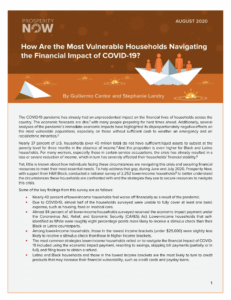 How Are the Most Vulnerable Households Navigating the Financial Impact of COVID-19?
How Are the Most Vulnerable Households Navigating the Financial Impact of COVID-19?
Prosperity Now
First published August 2020
The COVID-19 pandemic has already had an unprecedented impact on the financial lives of households across the country. During June and July 2020, Prosperity Now conducted a national survey of lower-income households to better understand the circumstances these households are confronted with and the strategies they use to secure resources to navigate this crisis.
Some of the key findings from this survey are as follows:
- Nearly 40% of lower-income households feel worse off financially as a result of the pandemic.
- Almost half of the households surveyed were unable to fully cover at least one basic expense, such as housing, food or medical care, because of COVID-19.
- About 84% of all lower-income households surveyed received the economic impact payment under the Coronavirus Aid, Relief and Economic Security (CARES) Act. Lower-income households that self-identified as White were roughly eight percentage points more likely to receive a stimulus check than their Black or Latino counterparts.
- Among lower-income households, those in the lowest income brackets (under $25,000) were slightly less likely to receive a stimulus check than those in higher income brackets.
- The most common strategies lower-income households relied on to navigate the financial impact of COVID-19 included using the economic impact payment, resorting to savings, skipping bill payments (partially or in full) and filing taxes to obtain a refund.
- Latino and Black households and those in the lowest income brackets are the most likely to turn to credit products that may increase their financial vulnerability, such as credit cards and payday loans.
